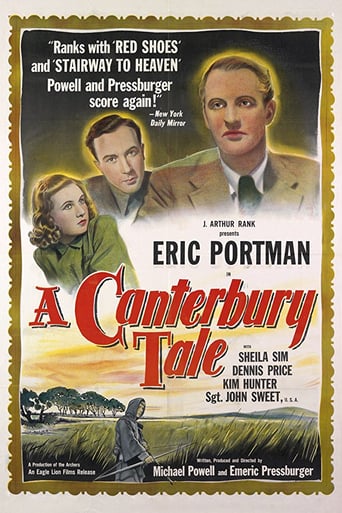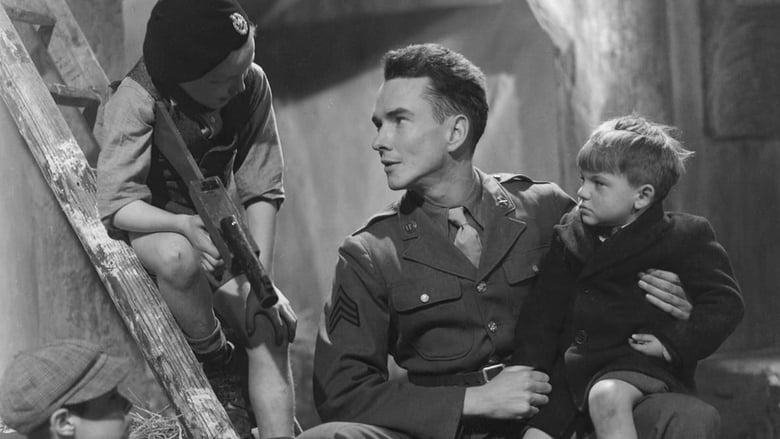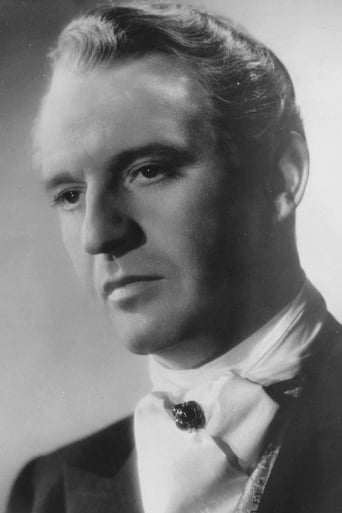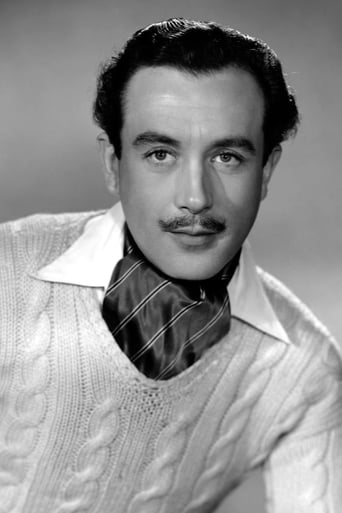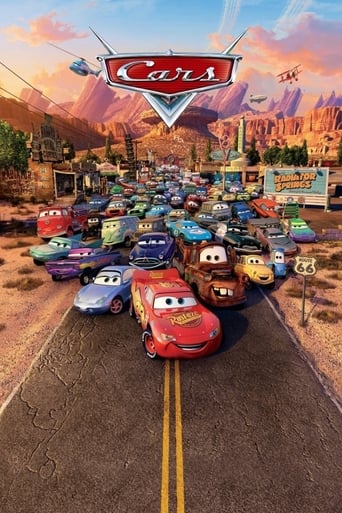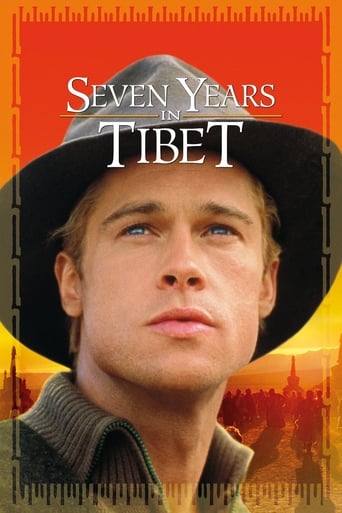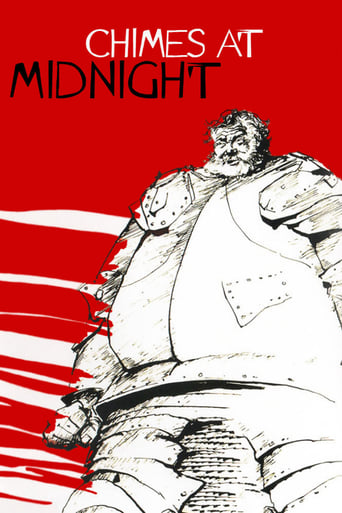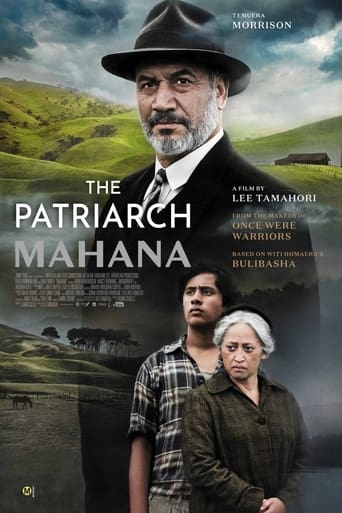A Canterbury Tale (1944)
Three modern day pilgrims investigate a bizarre crime in a small town on the way to Canterbury.
Watch Trailer
Cast


Similar titles
Reviews
As Good As It Gets
a film so unique, intoxicating and bizarre that it not only demands another viewing, but is also forgivable as a satirical comedy where the jokes eventually take the back seat.
All of these films share one commonality, that being a kind of emotional center that humanizes a cast of monsters.
The acting in this movie is really good.
https://trappedinthecinemablog.wordpress.com/2016/08/04/a- canterbury-tale-1944-%E2%98%85%E2%98%85%E2%98%85%E2%98%85/Very loosely inspired by Chaucer's 'Canterbury Tales', Powell and Pressburger's wartime drama 'A Canterbury Tale' (1944) was made during one of the most extraordinary consecutive directorial 'runs' ever: 'One of Our Aircraft Is Missing' (1942), 'The Life and Death of Colonel Blimp' (1943), 'A Canterbury Tale' (1944), 'I Know Where I'm Going!' (1945), 'A Matter of Life and Death' (1946), 'Black Narcissus' (1947), and 'The Red Shoes' (1948). All seven of them are British classics. And A Canterbury Tale is no different.The film opens with a Chaucerian knight, trekking through a forest on horseback, who lets free a bird of prey. And then, in a truly extraordinary moment of cinema, the swooping bird becomes a WW2 aircraft, and the knight becomes a tank. Technology and people have developed and 600 years of history have past.It is a remarkable moment of both magic and originality. It is also indicative of how under-appreciated Powell and Pressburger are. This scene has been forgotten from the public consciousness – never even remembered in the first place – yet when Stanley Kubrick referenced this moment in '2001: A Space Odyssey' (1968) with a bone spinning in mid-air and becoming a spaceship (similarly indicating the passage of time and the development of technology), he is acclaimed as a genius for his originality.The rest of the tale leaves behind any Chaucerian plot, but does keep the tendency for eccentric characters. A small town near Canterbury is being terrorised by "the glueman", a mysterious man who pours glue over women's hair at night. There is probably a reference to a particular Chaucerian character here, which sadly went straight over my head.Into this town arrives a US soldier who gets off at the wrong station, and a British woman from the city who has come to work as a land girl for the war effort. And as they begin to turn their attention to investigating the Scooby Doo-esque glueman, they find themselves caught up and encapsulated in the nature of English rural life.The film is a love letter to the English countryside, landscape, and pastoral life. Characters regularly take walks up hillsides, just to admire the views. The film shows rural life and its traditions in great detail, and with great affection. And we see Canterbury Cathedral, a permanence in the country for so many centuries.The war, meanwhile, is relegated to a mere subplot. This indicates exactly what Powell and Pressburger are trying to say. The war is an incidental feature. It does not obstruct any of the characters' lives. It is a mere passing inconvenience. In one hilltop scene characters discuss a remarkable view, but do not mention the dozens of barrage balloons which litter the sky. P&P – which they should never be referred to as – are telling us that England and English life will continue as it always has done, from 600 years ago in the medieval era, through the present era unaffected by world war, and forever into the future.On a side note, for those worried about their ignorance of Scotland and Scottish life, they dealt with that in their following film, I Know Where I'm Going! And for those worried about their ignorance of Wales and Welsh life, as far as I can tell, they didn't give a sh*t.Perhaps A Canterbury Tale lacks the same magical spark as the greatest of their works, A Matter Of Life Or Death, or The Red Shoes, for instance. But this in no way should be seen as a dismissive comment. A Canterbury Tale still contains some remarkable moments from a pair of remarkable directors, especially the moment that Stanley Kubrick clearly thought so highly of.
As much as I loved Powell's I Know Where I'm Going, this film, a propaganda piece from 1944, is bloody mess, with no script that makes any sense, terrible casting, acting, and direction. It takes forever to get going, and then goes nowhere. We are led to believe that four modern day pilgrims are going to head to Canterbury, but instead we have a mish-mash of a slight and ultimately silly story about a "glue man", and who knows what else. the American was annoying throughout, the Brits not much better, with the only redeeming presence being that of the young lady. I guess there are some decent scenes of Canterbury in black and white, but the story fails to hold any interest, except to a select group of auteurs who somehow have rated this film high for reasons unknown.
I was a bit surprised by "A Canterbury Tale", as it obviously was well made (after all, it was a Powell/Pressburger Production--having both written and directed it as well)--and this team made marvelous films. Yet, despite all its good parts, the whole picture just didn't work for me--mostly because it lacked a good story and some of the acting was downright embarrassing.The film is set in the English countryside during WWII. An occasionally dim-witted American bumpkin (sort of like a slightly smarter version of Gomer Pyle--terribly overplayed by an amateur American actor in his only film) gets off the train bound for Canterbury at the wrong stop. As a result, he's stuck in a country town until he's able to find his way to his destination. In addition, an English soldier and young lady also get off the train there. Soon they are embroiled in a rather irrelevant plot involving a weirdo who runs around throwing glue in ladies' hair in the darkness of the blackout! Talk about a stupid plot. But, as the plot really was seemingly unnecessary for the film and it's all just an excuse to make a film about the war effort, the wonderfulness of country life, camaraderie with the Americans and the similarities of all good people. Frankly, this was VERY frustrating as the film was wonderfully made in so many ways--great direction, lovely music, terrific camera work and a nice feel for the heartland of England...but no real story...none. So, I guess for a film with no real plot, a score of 6 is actually very good!I see that most reviewers really liked this film and some even adored it. Because of that, I felt pretty awkward about not liking the film, though Bob the Moo's usually thought-provoking review gave me some consolation--at least Bob saw some of the same problems I saw with the film! And, considering his excellent reviews, that puts me in pretty good company.
Whichever way you slice it this was a strange movie to make in 1944 and one that Powell and Pressburger chose to make enigmatic aiming it squarely between more like two and twenty than a mere two stools. The title gives the first clue that something more than two hours escapism is on offer and this is immediately followed up when four people en route to Canterbury come together a few miles short and eventually journey there together. There's also some low-key 'hands across the sea' propaganda when the yank from Oregon and the lumber mill workers in Kent discover they do things the same way, woodenly speaking. Some okay performances but ultimately less than meets the eye.

